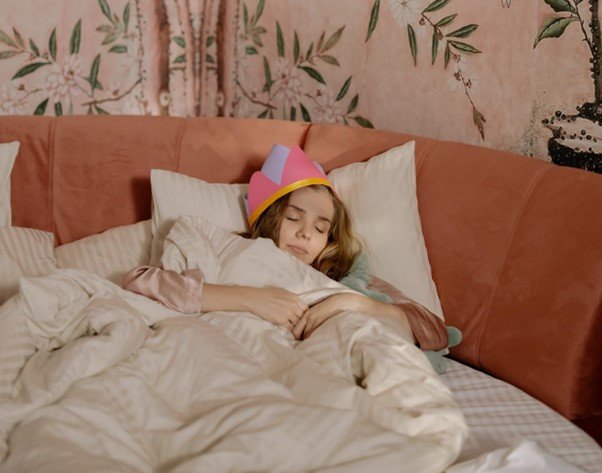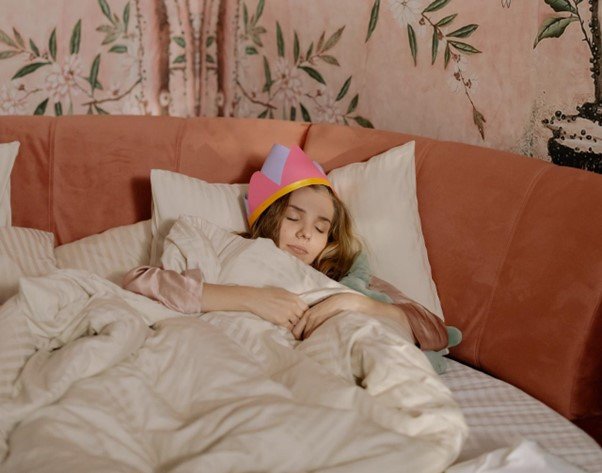7 tips on how to sleep like a Queen over the Jubilee Bank Holiday


Many of us neglect our sleep when it comes to a bank holiday, with no work it’s an excuse to stay up a little later than normal whether that be watching the next episode of our favourite Netflix show or having “one more drink” or laying in that little bit longer. However, sleep is vital for good mental and physical health so it’s important we don’t neglect good sleep hygiene even if it is a bank holiday.
Dr Lindsay Browning, psychologist, neuroscientist and sleep expert for And So To Bed shares her seven expert sleep hygiene tips to help make sure you don’t get into a poor sleep routine this Jubilee bank holiday.
Seven expert sleep hygiene tips
1. Have a regular bedtime and waketime
Keeping a regular wake and bedtime seven days per week will help you sleep better. Although this is a lot harder over a bank holiday, in which we use the extra free days away from work to plan more social activities, when you keep a regular sleep schedule your body develops a robust circadian rhythm helping you to sleep at the right time at night.
If you go to bed early and wake up early on weekdays, but stay up late and have a lie-in over the bank holiday weekend, you are giving yourself weekend “jet-lag” – making it much harder to go to sleep early on a Sunday night ready for an early start when that Monday morning comes around!
2. Increase your exercise levels
Moderate exercise like a brisk walk has been shown to increase your deep sleep during the night, helping you wake up the next day feeling more refreshed. You could use the bank holiday as an excuse to get out in the fresh air and go on a nice, long walk.
Make sure that you exercise during the daytime and not too close to bedtime, as an exercise in the evening can sometimes be disruptive to sleep, due to the release of endorphins and adrenaline.
3. Stop your caffeine intake at 2pm
A long weekend is a great excuse to organise catch ups with friends and family over coffee, however if you are looking to keep your sleep pattern in good health then you should always organise these coffee dates in the morning. This is because caffeine has an average half-life of 5-7 hours. That means that 5-7 hours after your cup of coffee, half of the caffeine is still in your system!
Caffeine is not only found in tea and coffee, but also in chocolate and in soft drinks such as cola and energy drinks, including the sugar-free variety. If you have trouble sleeping then it is recommended for you to have your last cup of caffeine of the day at around 2pm.
4. Night time digital detox
A recent study found that 1 in 5 are kept awake by their phones. Make sure that you switch off your electronic devices an hour before bed, in particular, your phone. Smartphones emit blue light which is the same as daylight.
This tricks the brain into thinking it is daytime which can make it difficult to transition into sleep mode when bedtime rolls around. Try reading a book or meditating before you sleep instead.
Phone usage before bed is also more likely to increase anxiety, seeing an email from work, an upsetting news story or something on social media you don't like will stick in your mind and stop you from being able to drop off.
5. Have a warm bath before bed
Having a relaxing warm bath before bed will not only help you to wind down after a busy day, but also the temperature of the bath will help you sleep. When you go to sleep, your body temperature naturally decreases, which is why over half of the UK find it so difficult to sleep when it is hot.
If you have a warm bath, then you artificially raise your body temperature and when you come out of the warm bath, your body temperature will naturally start to drop, mimicking the drop in temperature that happens as you fall asleep, making you feel sleepier. Why not treat yourself to a pamper evening over the bank holiday weekend, adding in some lavender scented oils or bubble bath will make your bath an even more relaxing experience.
If we get a warm bank holiday you may need to switch this warm bath for a cool shower to help drop your body temperature, just be sure not to make it too cold as this is more likely to wake you up and force your body to raise its temperature instead.
6. Don’t lie in bed for long periods if you can’t sleep
If you can’t sleep, then lying still in bed trying to sleep is one of the worst things you can do. The longer you lie in bed trying to sleep and clock watching, paradoxically the more anxious you are likely to get about not sleeping.
It is much better to get out of bed and do something else for a while instead of lying in bed not sleeping for hours, read another chapter of a book- just resist reaching for your phone!
Although a bank holiday may seem like the perfect opportunity to lay in bed for hours watching TV or scrolling on your phone, if possible your bed should only be used for sex and sleeping. Any other use and your body will start to associate the bed with activities away from sleeping, making it harder to drop off when bedtime rolls around."
7. Go easy on the alcohol
For many people bank holiday weekends provide us with an opportunity to enjoy extended time with family and friends, Jubilee street parties, beer gardens and BBQs are definitely on the cards! These extra days away from work can bring a temptation to drink more alcohol than usual.
Alcohol is a sedative and can help with falling asleep. However, as the alcohol is metabolised (processed by our body), it promotes wakefulness in the latter half of the night – meaning that you wake frequently in the early hours. Alcohol also affects the normal progression of the sleep stages we go through each night, meaning that the sleep we do get is not as restorative.
Lastly, alcohol is a mild respiratory depressant, meaning that it makes breathing slightly more difficult. This is really important for people with sleep apnoea because their sleep apnoea will be worse when they have drunk alcohol making them wake up more frequently as they repeatedly stop breathing with the apnoea.The after-effects of heavy alcohol consumption (i.e. a hangover) not only affect your sleep but also your daytime cognitive and psychomotor performance the next day. Even after a day drinking session, alcohol can still affect your sleep during that night.
If you want to maintain a good sleep routine this bank holiday weekend then consuming alcohol at lower doses has shown to have less of a disruptive effect on sleep - you are less likely to wake up in the early hours and your sleep stages will be closer to normal the less you have drunk meaning better sleep. This way we can all still enjoy a drink over the bank holiday weekend without disrupting our sleep patterns too much!
- 5th May 2022


